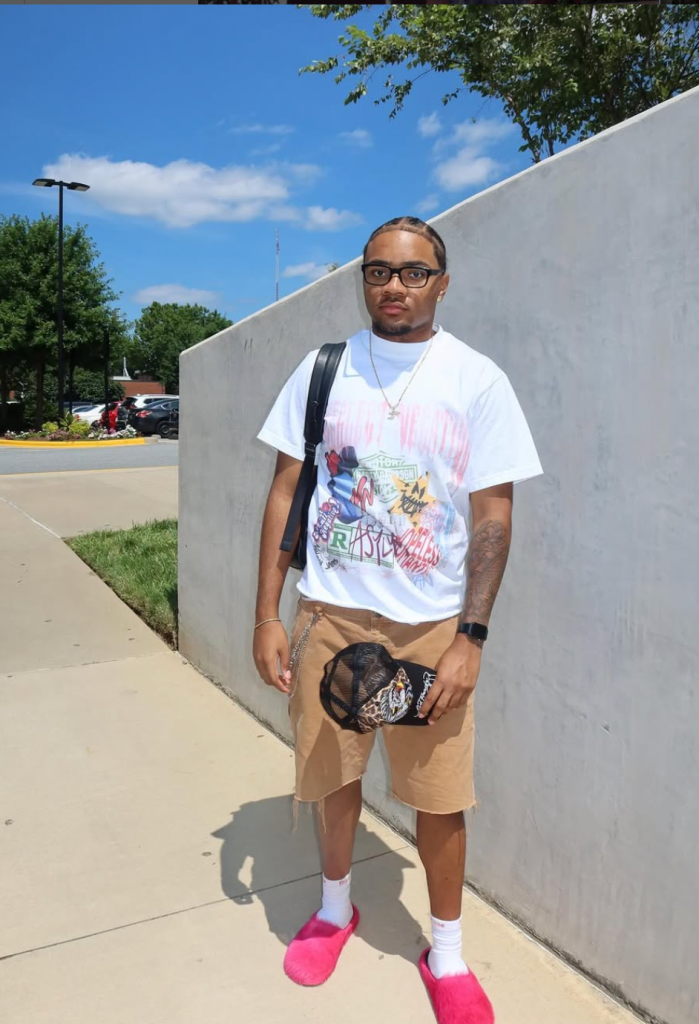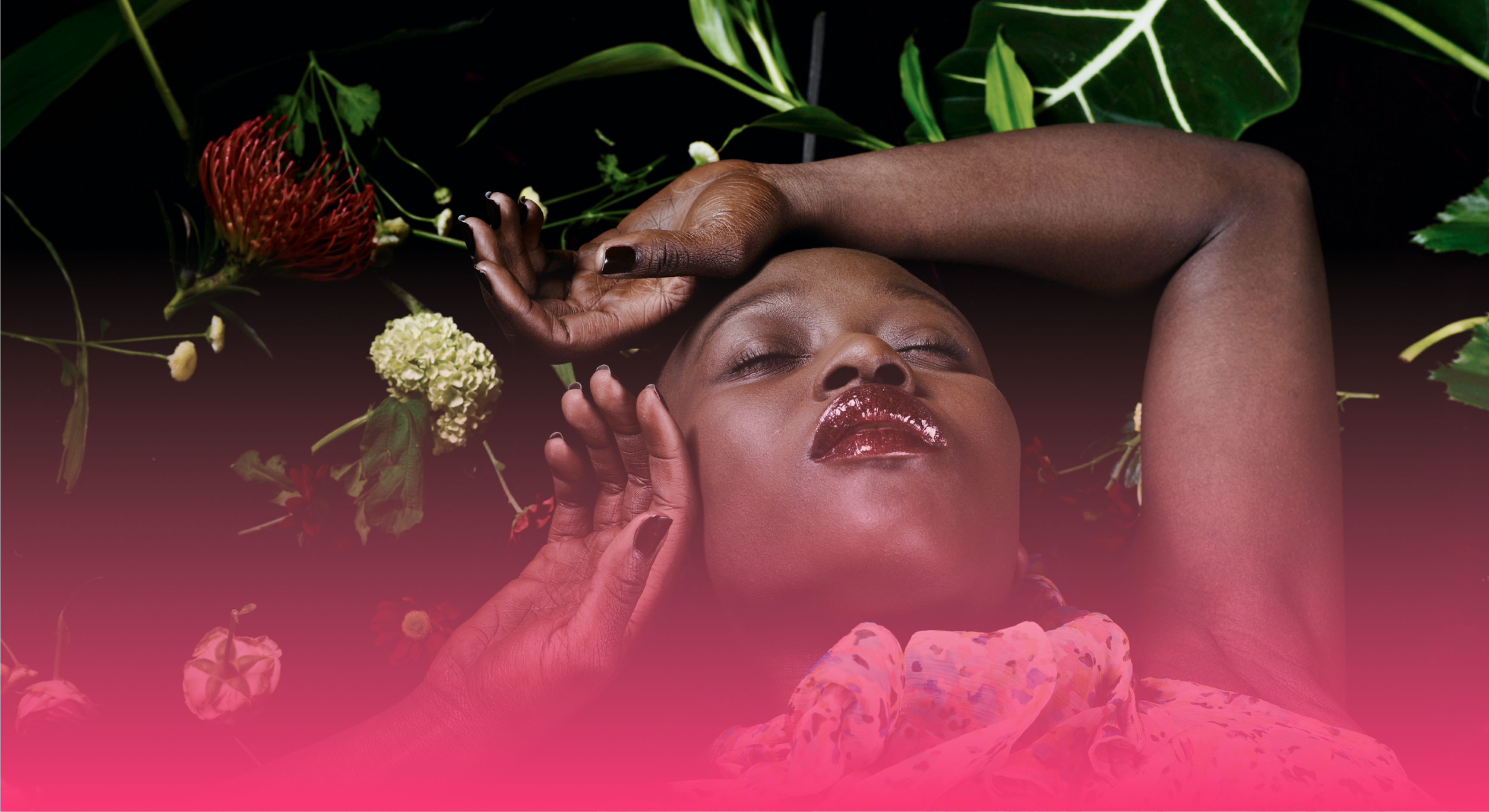How These HBCU Seniors Balance Eczema Care & Confidence
How These HBCU Seniors Balance Eczema Care & Confidence

Atopic dermatitis, or eczema, is a common skin condition that affects about 31 million Americans, according to the National Eczema Association. Many of those affected happen to be Black, and when we have eczema, it tends to hit us particularly hard. A 2022 study on eczema among Black and Latine populations found that “Black people in the US experience greater atopic dermatitis (AD) prevalence, severity, and persistence when compared to white people.”
Eczema is non-contagious and can affect people of any age. It can happen anywhere on the body, though the hands, face, neck, feet, and elbows are among the most common locations for flare-ups. At best, it’s irritating, causing itchy, dry, flaky patches of skin. At worst, you can experience cracking and bleeding skin on top of all those other symptoms.
Eczema isn’t curable, but thankfully, there are ways to keep it under control—with and without a prescription. While some people prefer at-home and over-the-counter remedies (like using hydrocortisone or slathering themselves in petroleum jelly), others need something a little stronger, and that calls for a trip to the dermatologist.
An eczema flare-up might cause you to switch up your skincare routine or change the way you eat for a short time, but one thing it shouldn’t do is slow you down. And that’s especially true if you’re a college student.
Campus life can be exciting and fun, but it can also be busy and stressful. To add managing eczema on top of a schedule packed with classes, clubs, Greek life, work, and internships—it’s a lot. But it’s not impossible to juggle and do it with finesse.
Need proof? We found three HBCU students doing just that. They’re fly, fashionable, and making major moves while managing their eczema. Read on to learn about their routines, tips, and tricks for keeping their eczema under control—and looking good while doing so.
Briana Jones-Gill

Briana Jones-Gill’s name might not be familiar to you yet, but the way she’s going, it’s only a matter of time before it is. And if it isn’t her name, it will probably be her voice. The rising FAMU senior is a broadcast journalism major who is serious about building her craft. She’s a creative director of Journey magazine on her campus and a content creator for the FAMU newspaper. She’s an on-air personality at her school’s radio station, the lead desk anchor for FAMU’s TV 20, and one of the Millennials in Motion podcast personalities.
Briana spends lots of time on screen, so she’s always trying to look her best, which typically isn’t hard. But when she gets an eczema flare-up, that can complicate things. “When I’m going to be on camera, I want to make sure that I’m picture-perfect,” she shares with HelloBeautiful. Briana’s eczema typically appears on the back of her legs and on her cheeks, which isn’t ideal when you’re being recorded.
In that situation, she switches up her beauty routine. “My skin can be unpredictable when it comes to using different products and wearing makeup—I always have to be ready for anything.” A simple skincare routine is key for her, especially since she takes no prescriptions to treat her eczema. Home prevention and remedies are her bread and butter. When she washes her face, she uses a very gentle Cetaphil Cleanser, which she follows up with a toner and moisturizer. Also important: SPF. “You don’t want eczema to mix with a sunburn.”
Like many Black people with eczema, several members of Briana’s family share the same skin issues. “I have so many people to [talk to] and lean on,” she says. Her family’s support and care practices sustain her, and she’s established her own best practices for avoiding—and treating—flare-ups. When her skin acts up, she slathers on the moisturizer and is sure to take showers to keep the areas clean.
At-home remedies work for Briana, but not every person chooses that route. For some folks, a prescription is preferred or even necessary, and that calls for a trip to the dermatologist. But that process can be complicated in a medical landscape that is less-than-hospitable to the Black population.
Jayden Hall-Ingram

No one knows this from experience better than Jayden Hall-Ingram, a North Carolina Agricultural and Technical State University senior. The speech pathology major and psychology minor shares the details of his journey looking for a dermatologist nearby in North Carolina, and it’s been a difficult one.
When Jayden is not in class, he’s involved in many extracurriculars: student government, honors college, community service, and research assistant. One of the things he’s most passionate about is healthcare advocacy. He serves as a peer facilitator at the student health center on campus and studies Black maternal health, HIV, and the LGBTQ+ community. His experiences have led him to advocate not only for the community he serves but also for himself.
“There aren’t enough good dermatologists for Black people,” he shares with HelloBeautiful. “In the south, it’s rare to have any type of Black primary care physician. All of my doctors are white women. You have to heavily advocate for yourself, which is unfortunate, but I’m used to doing it.” Jayden has gone to a dermatologist to help him with his eczema—which mostly flares up on his back and his arms—in search of prescriptions and more strategies for management. “I feel like a lot of doctors are just trying to check off a box,” he says.
Jayden recalls a moment at the dermatologist’s office when one appointment turned into two: “They said they didn’t have much time to dive into everything, but at my next appointment, they’d look into it further,” he says. “They didn’t really look into my eczema at all.” If you’re keeping track, that’s two separate copays to help with an issue that most likely could have been remedied in one session.
With a grooming routine he describes as “more strenuous” than other guys he knows, Jayden takes meticulous care of himself and carefully manages his flare-ups. “I use an African net sponge and Dove bar soap in the shower—things that are more hypoallergenic,” he says. Dove bar soap is a favorite of dermatologists for its gentle cleansing and moisturizing properties. “I also use raw shea butter to moisturize.” His skincare routine consists of a PanOxyl cleanser for his face and SPF to protect his skin. At night, he uses tretinoin.
His routine doesn’t change much when he has a flare-up—just the addition of hydrocortisone to help ease the itching. Though Jayden hopes his next trip to the dermatologist is more helpful, he wants to use his experiences to help other Black people get better outcomes when they go to any doctor. “It’s why I want to get into the healthcare field for my career,” he explains.
Kaya Brown

FAMU senior Kaya Brown is an example of how manageable eczema can be when you have access to a doctor who is serious about your treatment. The business and administration major relies on her prescription when she has a flare-up. “[I’m] quick to go to a dermatologist,” she tells HelloBeautiful. “I have a prescription cream. As soon as eczema pops up, I’m applying that cream every night before I go to bed. Within two days, it’s cleared up.”
Kaya’s eczema likes to pop up on her face and in the creases of her elbows—two incredibly common locations. “I look in the mirror, I see the bumps coming, and I’m like, ‘Here we go again.’” Though her prescription is her main source of treatment, she’s sure to maintain a beauty routine that’s as gentle as possible so she’s not inviting any irritation.
“I learned that I can only use hypoallergenic foundation when I want to wear makeup,” Kaya shares. “I learned that when I was still dancing for a ballet company, which required a full face when we performed.” She keeps her makeup pretty minimal, typically opting for Fenty mascara and beauty supply store lip gloss. If she’s feeling fancy, she might upgrade to a Fenty gloss, too. As for skin and body care, she avoids heavily perfumed lotions, and instead clings to her Palmer’s Cocoa Butter and Lubriderm. She uses the very gentle Cetaphil cleanser to wash her face, and moisturizes with a face lotion from the brand.
Her guilty pleasure, though? Fragrances. Spraying on a bit of perfume to smell extra good is something many of us can relate to, though the formula of those scents can sometimes irritate your skin. “I do get eczema across my chest a little bit,” Kays says. That area is prime real estate for a good scent. “I’ll spray fragrances, but not that often — usually when I go somewhere that I’m dressed for. This summer, I’ve been a little low on fragrances because my internship is remote, and the in-person job I have is a retail job with the Atlanta Braves. I’m not spraying a bunch of fragrances to go to Truist Park.” When she’s in school, though, she does spray on a little something for class before she heads out the door. “But if I try [a scent] and it doesn’t work [for my skin,] I never spray it on again,” Kaya says.
She may be finishing up her senior year at FAMU, but Kaya’s already looking ahead beyond graduation in December. On her docket: Grad school in August 2026. What she’ll do in between? Work, stack her bread, and keep her skin clear of flare-ups in the meantime.













